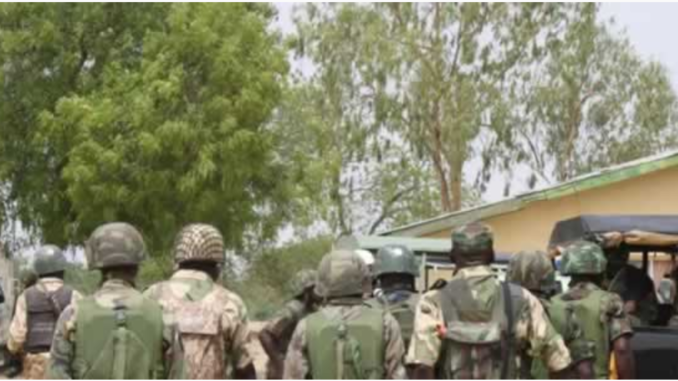
The unwelcome recrudescence of soldiers refusing to be deployed in the battlefield against the rampaging Boko Haram fighters occurred on August 12 in Maiduguri. The troops were assembled at the airport to board a flight that was headed for Marte, a border locality. For about two hours, they seized the Maiduguri airport; shot sporadically in the air to the trepidation and chagrin of other travellers, whose flights were inevitably disrupted. “We need some rest, we are war-weary; and need to see our families,” one of the soldiers reportedly said. According to media reports, the riotous soldiers were meant to stay in the battlefield for one year, but have entered their fourth year. The main issue is the insensitivity of representative channels for soldiers to advance their grievances.
Their action may seem unprofessional but military authorities should not see the development from the prism of mutiny as they often do; they should see the bigger picture of an insight into why there is a resurgence of the insurgents, leaving in its wake, heavy death tolls on the soldiers and the civilian populace. It is ineffective soldiering that could have led to three recent attacks at military bases during which Boko Haram fighters reportedly killed scores of soldiers, carting away their weapons and vehicles. About 17 soldiers were said to have lost their lives when the military base at Garunda village, in Borno State, was breached recently. A similar attack had earlier taken place in Jilli, located 60 kilometres away from Geidam, in Yobe State. Here, the terrorists reportedly overran soldiers of 81 Division Forward Brigade.
For the war-weary soldiers to have openly evinced their grouse means that a lot might have gone wrong at the battlefield for long. If they are meant to be in the war-torn territories for a specified period, as they claimed, then the Chief of Army Staff, Tukur Buratai, should not hesitate to replace them with fresh hands. Besides common sense, military strategy demands just that. A soldier, who complains of being battle-weary or home-sick, has nothing anymore to offer; except to retreat or scamper for safety as the enemy advances.
This explains, perhaps, why the country is beginning again to record high casualties from the war. The reality is drawn home with the United Nations recent decision to suspend the humanitarian work of its agencies in Monguno, Borno State, with effect from August 19, because of security concerns. The area has 100,000 internally displaced persons, according to the Alliance for International Medical Action. This means more privations for these hapless victims of the jihadists’ bloody and mindless campaign.
In military circles, it is an article of faith that there are “no bad troops, only bad officers.” This aphorism resonates here. The first time soldiers in Borno State expressed fury against their superior was when some of them were ambushed and slaughtered in 2012 during a night journey their commander ordered them to embark upon against their will. Seeing the bodies of their dead colleagues, they became livid and shot at the commander.
Therefore, when the soldiers begin to defy an order for deployment, the military authorities should read between the lines. In the same August, 2014, 40 soldiers from Maimalari Barracks, Maiduguri, declined their being drafted to Gwoza and Damboa war zones in Borno State, because of being ill-equipped. Before the soldiers’ open defiance, their wives had barricaded the barracks gate to prevent the truck that came to carry their spouses away from doing so. They agonisingly screamed, “We don’t want to be made another set of widows; give our husbands better arms and modern weapons or they go nowhere.”
As the insurgents take the war directly to the soldiers in their barracks, it underscores the point that the war is far from being won, contrary to President Muhammadu Buhari’s self-adulation in 2017 that Boko Haram had been technically defeated. Evidently, the jihadists’ Garunda and Jilli military bravado is why some IDPs are petrified about returning to their liberated but desolate villages. Nobel laureate, Wole Soyinka, once said that Boko Haram’s defeat was not just a military engagement but a game of the “mind.” Unfortunately, the military authorities are yet to appreciate his logic. Even critical members of the public have drummed it into the ears of the President that the service chiefs need to be replaced for new ideas and strategies to evolve.
The war against Boko Haram must be won. In countries that have had similar military engagements, the deployment of intelligence and swift counter-insurgency strategies made the difference. In Italy, the Red Brigade carried out 10,000 acts of violence, which included the abduction of James Lee Dozier, an American NATO Army General. The government reduced jail terms for convicted terrorists in exchange for information about their leaders. This paid off.
Many Nigerian soldiers of this generation have not tasted war just as their counterparts in the United States and other parts of the world. But the war in Iraq and Afghanistan provided the Americans an opportunity. The Associated Press states that by spring of 2007, 150,000 active-duty soldiers, 85,000 sailors, 90,000 airmen and 65,000 Marines had gone more than once to Iraq and Afghanistan. This means that the call to duty is rotational. Buratai should try to embrace this idea now.
As Femi Falana, a Senior Advocate of Nigeria, said in defence of the 70 soldiers sentenced to life imprisonment for refusing to confront Boko Haram when ill-equipped, “the soldiers joined the Army to fight, not to commit suicide.” The authorities should make some sense out of this realism.
END

Be the first to comment